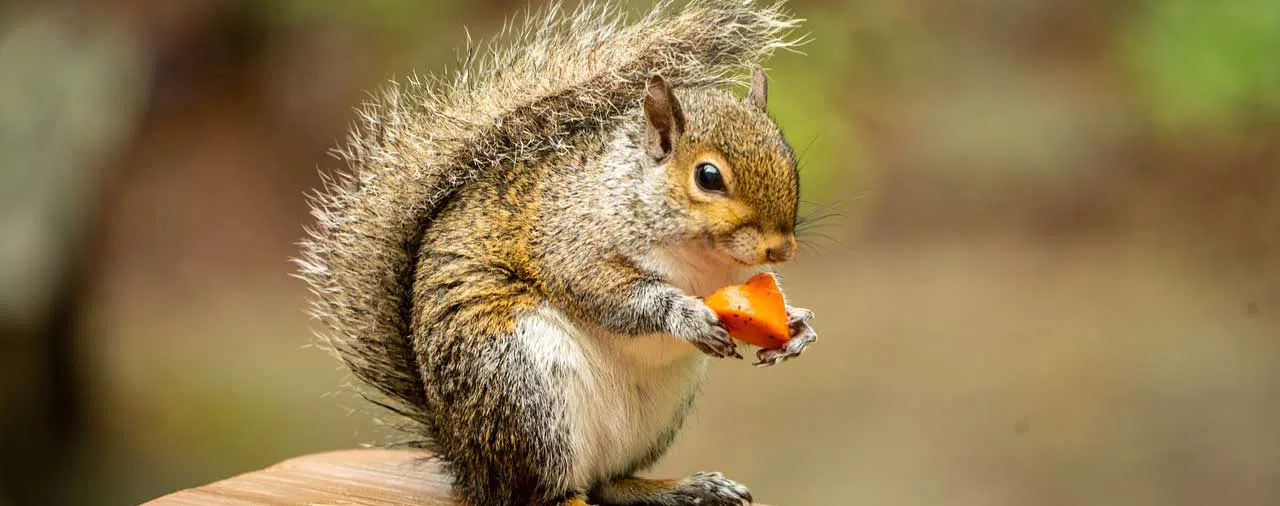Ah yes - your friendly neighbourhood squirrel :) We've all watched those nimble little acrobats defy gravity... along with our efforts to keep them out of bird feeders. Did you know that there are over 200 types of squirrels? Squirrels belong to the Sciuridae family, which also includes prairie dogs, chipmunks and marmots. In Ontario, we typically see the Eastern Grey Squirrel (Sciurus carolinensis); this is the common grey or black squirrel. While different in colour and perhaps confusingly named, they belong to the same species. Black is often the dominant colour in northern climates like Ontario and Quebec. The farther south you travel, the less black squirrels you will see. This may indicate that the gene responsible for black coloration provides some protection in cold-weather climates.

What Do Squirrels Eat?: Squirrel Diet Overview
Squirrels have four teeth in the front of their mouth; they continuously grow throughout their lives. Because they constantly regrow, they don't become dull or wear down.
When it comes to what squirrels like to eat, the eastern grey squirrel isn't terribly picky and therefore its diet varies according to what its surroundings and the seasons have to offer. In early spring, maple buds are a favourite. During the summer, the seeds of maple (samaras) and elm are staples, along with a wide variety of berries and other wild fruits, seeds, nuts, and apples. In the fall you may see squirrels collect hard nuts, including acorns, hickory nuts, butternuts, walnuts, beechnuts, and pine seeds. This is when they'll turn into avid little hoarders, burying all sorts of nuts and seeds in preparation for winter.
Types of Food Squirrels Consume
Squirrels are omnivores; this means their diet consists of both meat and vegetation. While we are all familiar with squirrels nibbling on bird seed and acorns, their full diet plan may surprise you.
Nuts and Seeds
The eastern grey squirrel will eat just about any nut there is. Of course, many of the yummy tropical nuts aren't available in Ontario. So, our grey or black squirrels primarily eat acorns and walnuts. As for seeds, tree seeds are on the menu in the wild, and anything you stock your birdfeeder with will also be gobbled up. Black oil sunflower seeds seem to be a favourite.
Fruits and Berries
Almost anything goes: from blueberries to apples. Squirrels will enjoy much of your garden crop: melons, grapes, strawberries, raspberries, cherries, peaches, pears, and more. They'll nibble on a variety of vegetables, too!
Vegetation
Much of your garden will be fair game. From red leaf lettuce to snow peas and zuccini - squirrels will happily relieve you of some of that. But, they also consume dandilion greens, roots, daisy (and other) blooms, and even some mushrooms.
Insects and Small Animals
Like all mammals, squirrels also need proteins. So, small insects, such as crickets, grasshoppers, winged bugs, and larvae can be part of a squirrel's diet as well. When the picking gets slim, they might even stoop down to disecting a mouse or mole.
Factors Influencing Squirrel Food Choices
Seasonal Availability
When looking at what do squirrels eat in the wild, the single biggest factor infuencing the diet of a squirrel is availability. Especially, in cooler climates, there will be a stark difference of foods available between seasons. When the lush greens of spring and summer fade away, squirrels will resort to insects, mushrooms, or even small mammals, such as mice or moles.
Habitat
An urban squirrel's diet will differ from one living in a forest. Squirrels are opportunistic hunters/gatherers and while the ideal diet will include seeds, nuts, and blossoms in the wild, a trash bin or fast food droppings will do in the city.
Competition
In an area with plenty of wood peckers or rabbits, squirrels have to compete for resources, as all of them consume a similar diet. In areas where both red and eastern gray squirrel are present, they both compete for the exact same resources and habitat, with the gray squirrel usually faring better.
Impact on Human Habitation
Squirrels in your yard is one thing, but squirrels in your attic presents an entirely different set of dilemmas. Squirrels are prolific diggers and chewers, often damaging roofing, siding, wiring and insulation. This can lead to issues from higher energy consumption to fire hazards. Squirrel droppings are usightly and potentially infested with bacteria - also something you really won't want in and around your home. The Ministry of Natural Resources has put together of list of things you can do to discourage squirrels from taking up residence around your home.
Squirrel Infestation? Call Hawkeye!
If you have eliminated what squirrels like to eat most and still find your yard or home inundated with squirrels, turn to the professionals. Hawkeye Bird & Animal Control deals with squirrel removal and subsequent squirrel-proofing your home to prevent repeat offenders. Contact Hawkeye today for your free quote!














